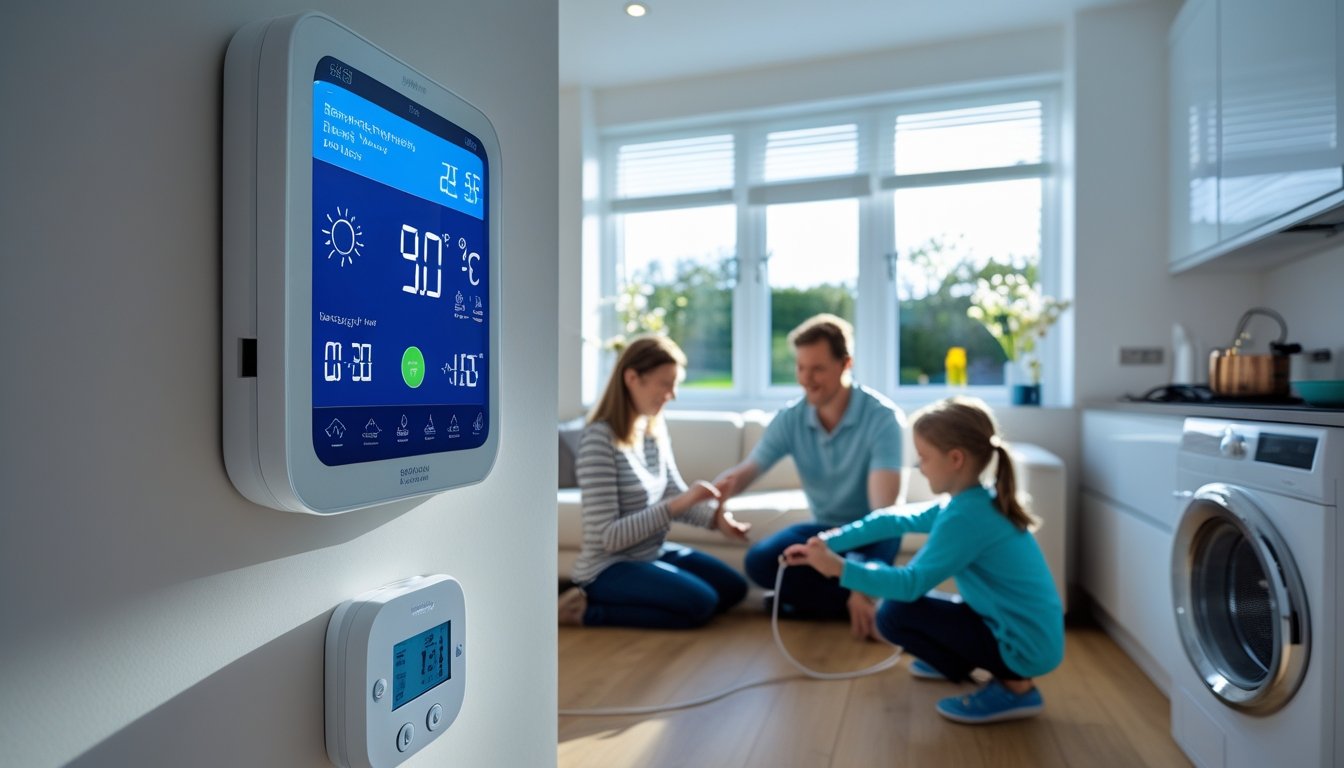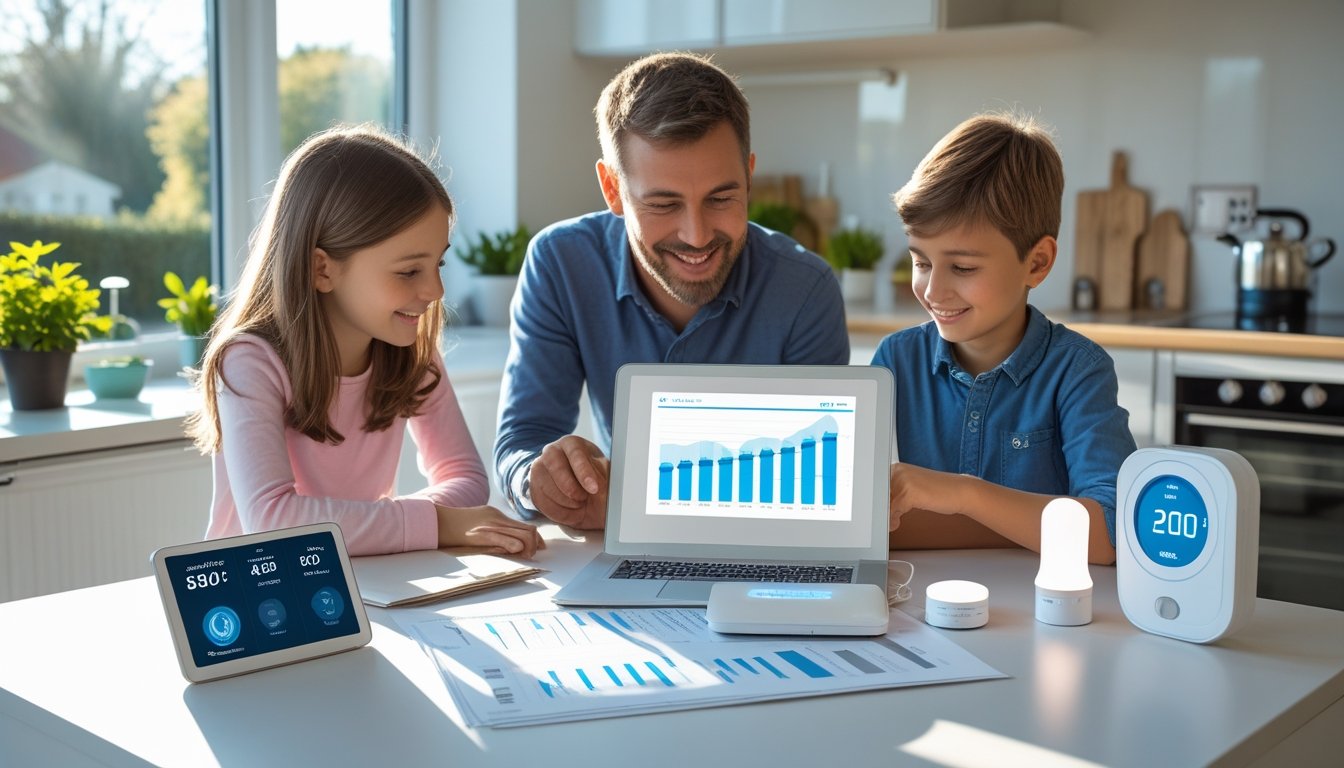Late updated: 01 Jun 2025 12:06
Written by: Eleanor Hartman
How To Lower UK Household Electricity Costs: Effective Strategies for Savings
Reducing household electricity costs in the UK is a priority for many of us, especially in light of recent energy price increases. By making simple adjustments to our day-to-day habits and investing in energy-efficient appliances, we can significantly cut down on our electricity bills. Turning off lights and appliances when not in use and opting for LED bulbs can make a substantial difference to your monthly expenses.

We all know that understanding the components of our energy bill is vital in identifying areas to make potential savings. Embracing methods such as adjusting your boiler flow temperature and only heating specific parts of your home as needed, allows us to save energy effectively. Simple actions, like doing laundry at lower temperatures or reducing hot water usage, contribute to lower costs.
Another approach is ensuring our homes are well-insulated and utilising smart technology to manage energy consumption more efficiently. These steps not only conserve energy but also align with broader efforts towards environmental sustainability. Ultimately, by making these practices part of our routine, we empower ourselves to handle electricity costs better while contributing to a greener planet.
Key Takeaways
- Energy-efficient habits can lower electricity bills.
- Understanding energy use helps in finding savings.
- Efficient home management cuts costs and saves energy.
Understanding and Managing Your UK Household Energy Consumption
Effective management of household energy consumption in the UK requires clarity on billing calculations, smart meter benefits, and usage trends. By focusing on these areas, we can take practical steps to reduce costs and lessen our impact on the environment.
How Energy Bills Are Calculated
Energy bills in the UK are typically calculated based on a few key components. The primary element is the cost per kilowatt-hour (kWh) of energy consumed. This amount varies according to usage and the rate set by energy firms. Alongside this, we have standing charges, which are daily fees covering the cost of maintaining the supply grid and other infrastructure.
The energy price cap, overseen by Ofgem, regulates the maximum amount suppliers can charge per unit, offering some protection against excessive costs. Discounts may apply when customers switch to paperless billing or pay via direct debit. Being aware of these elements helps us understand how our consumption impacts our energy costs and provides leverage for finding better deals.
The Role of Smart Meters and Real-Time Energy Usage Tracking
Smart meters play a crucial role in managing energy consumption. These devices provide us with accurate, real-time data on electricity usage, thereby helping us to identify patterns and inefficiencies. With smart meters, energy usage is automatically sent to suppliers, eliminating the need for estimated billing. This means we only pay for what we actually use.
Devices like Hive or Nest pair with smart meters to give us more control over household energy use. We can adjust heating remotely and set schedules that optimise energy usage throughout the day. This transparency and control encourage proactive changes to reduce waste and ultimately save energy.
Analysing Household Energy Usage Patterns
To manage energy consumption effectively, comprehending usage patterns is essential. By tracking when and where we consume the most energy, we can pinpoint the primary contributors to high energy bills. This analysis can be aided by data from smart meters, which offers insight into hourly, daily, or monthly usage.
Applying this information allows us to modify our lifestyle. Simple changes, such as using energy-intensive appliances during off-peak times, can lower costs. Identifying these patterns enables us to implement targeted measures to reduce energy costs while maintaining comfort and convenience in our homes.
Effective Strategies to Lower Electricity Costs at Home

In the face of rising energy costs, there are several effective methods to reduce our household electricity expenses. From upgrading to energy-efficient appliances to adopting smart technologies, these strategies can lead to significant savings.
Switching to Efficient Appliances and Lighting
Upgrading to energy-efficient appliances can considerably lower electricity costs. Modern appliances like microwaves, air fryers, and slow cookers use less energy compared to older models. These appliances provide quicker and more efficient cooking, which helps in reducing energy usage.
Lighting plays a crucial role as well. Replacing traditional bulbs with LED bulbs can significantly cut energy consumption. LED bulbs use up to 80% less energy and have a longer lifespan, making them a wise investment. It's essential to check the energy rating on new appliances to ensure efficiency.
Optimising Heating and Insulation Solutions
Heating can account for a large part of our energy bills. Adjusting boiler settings to the most efficient levels can lead to measurable savings. Installing thermostatic radiator valves provides precise control over radiator temperatures, avoiding unnecessary heating expenses.
Draught-proofing and insulating our homes further improve efficiency. Draught excluders can be fitted to doors and windows to prevent heat loss. Proper insulation in walls and lofts keeps our home warmer, requiring less energy for heating.
Making the Most of Smart Technology and Tariffs
Utilising smart technology can help us manage electricity usage better. Smart plugs allow us to control appliances remotely and switch them off when not in use. Smart heating systems give us the ability to schedule heating only when needed, reducing wastage and bills.
Exploring special tariffs such as PeakSave can be advantageous. These tariffs offer lower rates during off-peak hours, encouraging us to adjust our usage patterns for cost savings. Identifying and taking advantage of such schemes can further reduce electricity costs.
Implementing Practical Everyday Energy-Saving Tips
Incorporating simple energy-saving tips into our routine also helps. Switching off appliances rather than leaving them on standby can save energy. Spending less time in the shower reduces both electricity and water bills.
Practising regular maintenance on appliances ensures they run efficiently. It’s these small but practical measures that accumulate over time to make a noticeable difference in reducing household electricity costs, and in turn, help us manage the cost of living crisis more effectively.
Frequently Asked Questions

We address common queries related to reducing household electricity costs in the UK. Discover effective methods, understand the impact of unplugging devices, and learn about potential government incentives.
What are effective methods to reduce my energy consumption at home?
We can save energy by adopting solutions such as installing draught proofing, using LED light bulbs, and setting thermostats to appropriate levels for efficiency. Regular maintenance of appliances ensures they function optimally. Taking shorter showers and avoiding tumble dryers help too.
Which appliances consume the most energy in UK households?
Typically, heating systems, washing machines, and tumble dryers are among the highest energy consumers. Refrigerators and freezers also use substantial electricity as they run continuously. Recognising these devices allows us to strategise usage effectively and save on energy costs.
Can unplugging electrical devices lead to significant savings on energy bills?
Yes, it can contribute to savings. Many devices consume energy even when not in use, often referred to as standby power. Unplugging them when idle prevents this wastage. Using power strips to easily switch off multiple devices at once further helps in reducing electricity use.
How can I modify my home to be more energy-efficient?
Upgrading insulation, installing energy-efficient windows, and using smart thermostats can significantly enhance energy efficiency. Adding solar panels, where feasible, offers renewable energy opportunities. These modifications not only reduce energy bills but also increase home comfort.
What behavioural changes can contribute to lower electricity usage?
Simple actions like turning off lights when leaving a room, using natural light during the day, and washing clothes at lower temperatures make a real difference. Being mindful of appliance use, such as only boiling the necessary amount of water, can also result in noticeable savings.
Are there any government incentives available to support energy efficiency in homes?
Yes, various schemes exist to promote energy efficiency. The Energy Company Obligation (ECO) and the Green Homes Grant are examples encouraging home improvements. These incentives can help offset costs associated with energy-efficient upgrades, making them more accessible for homeowners.